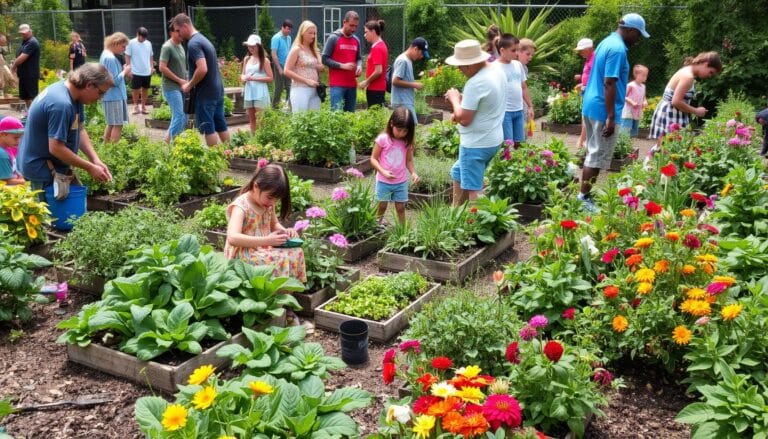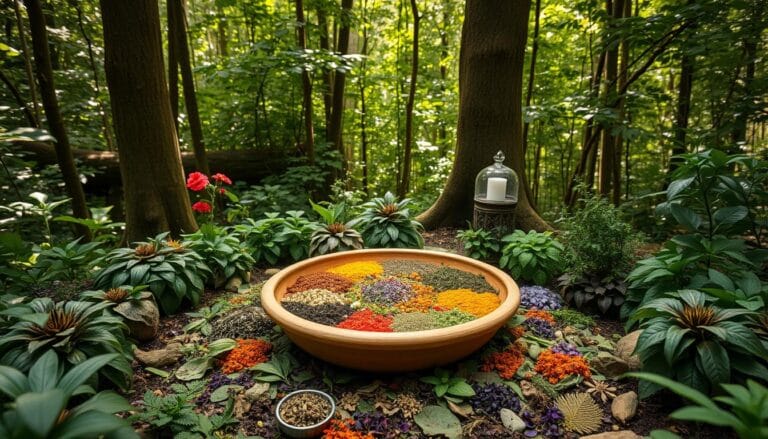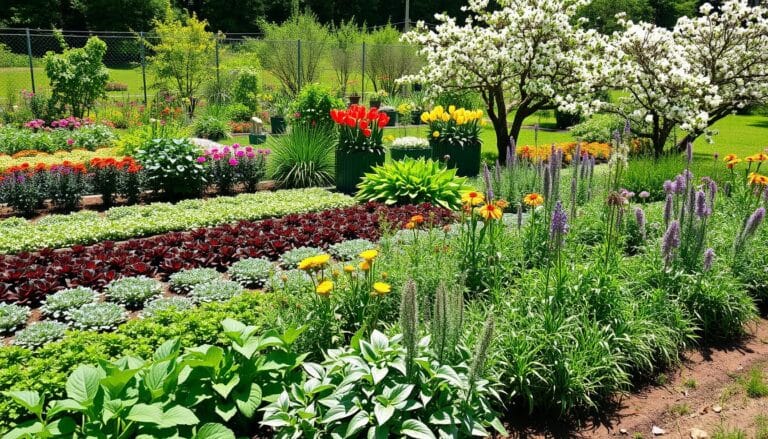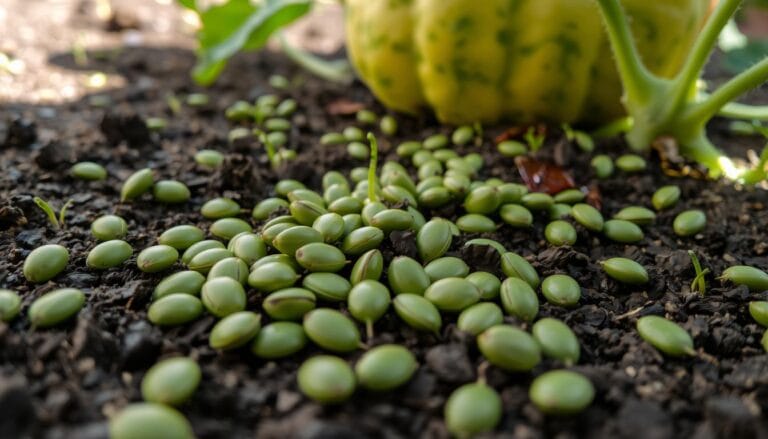The Best Careers in Horticulture for Nature Lovers and Plant Enthusiasts.
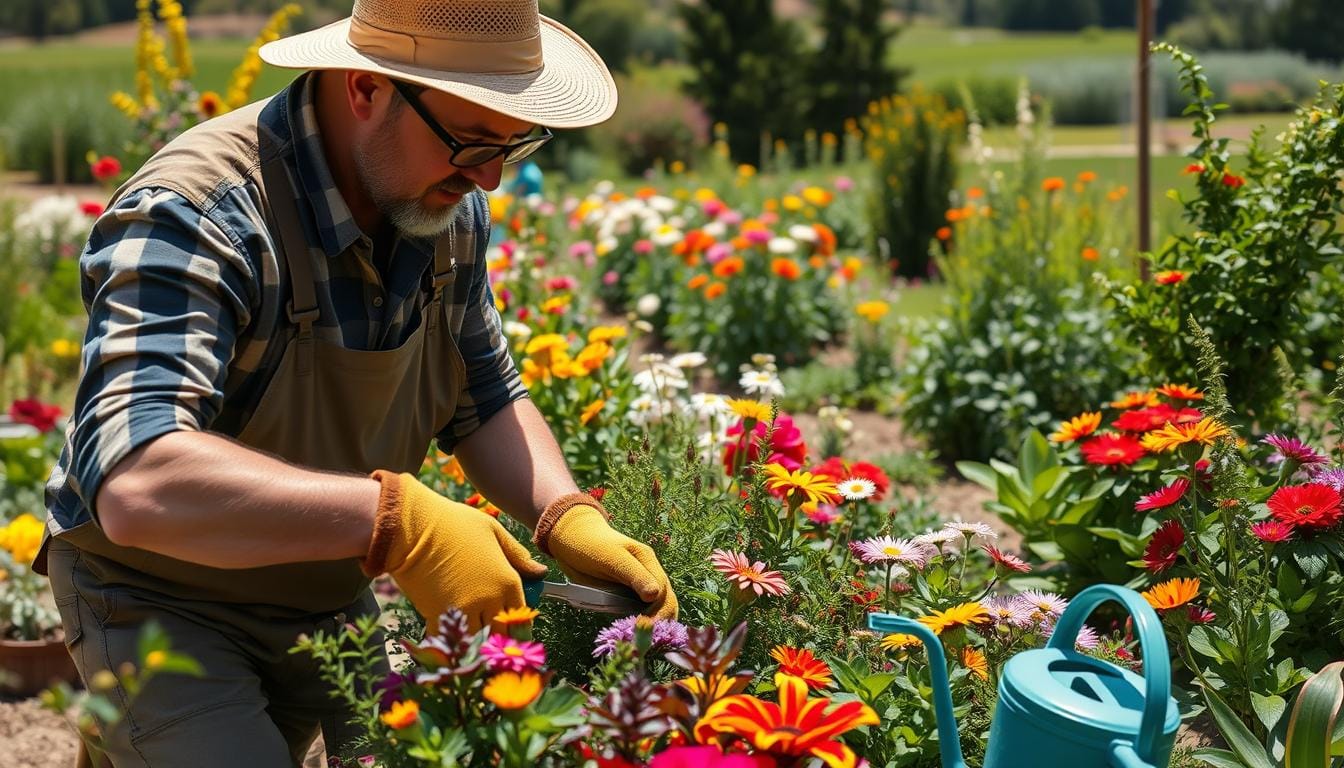
As I step outside, the breeze gently touches my face. The birds sing all around me. This moment shows how close we are to nature, a key part of horticulture. This field has many careers that are both rewarding and diverse.
Do you love growing gardens, raising plants, or designing landscapes? Horticulture has endless chances for you to grow and succeed.
Horticulture includes many jobs, like florists and groundskeepers. You could also work in plant breeding, landscape design, or greenhouse management. Each job lets you make a real difference in our world.
Ever thought about one careers related to horticulture? From horticulturist to gardener and landscape designer, there’s a lot to explore. Start a career that lets you connect with nature, grow plants, and make a lasting impact.
Table of Contents
Understanding Horticulture as a Career Field
Horticulture is a field that deals with growing fruits, veggies, flowers, and plants for beauty. You can be a botanist, arborist, plant scientist, or greenhouse manager. Each role offers a chance to work hands-on, do scientific research, and help the environment.
Definition and Scope of Horticulture
Horticulture is all about growing and caring for plants. It includes growing fruits, veggies, flowers, and plants for looks. Horticulturists work to grow plants well, from start to finish, for food, beauty, and the environment.
Impact on Modern Agriculture and Environment
The horticulture industry is key for food security and healthy food. It uses green practices like organic farming and saves water. New tech like drip irrigation and vertical farming also boosts the industry, making it more efficient and productive.
Industry Growth and Future Prospects
The horticulture industry is growing fast. People want fresh, local food, and care about the environment. As a botanist, arborist, plant scientist, or greenhouse manager, you can help grow the industry. You’ll work with plants, do research, and use new tech to shape the future of farming.
“Horticulture is not just about growing plants – it’s about creating a sustainable, environmentally-conscious food system that nourishes both people and the planet.”
Educational Requirements for Horticulture Careers
The educational needs for horticulture jobs differ based on the role. Some jobs, like grounds maintenance or nursery worker, might need little to no college. But, for horticulturist and agricultural specialist roles, a bachelor’s degree or more is often needed.
Bachelor’s degrees in horticulture teach about soil sciences, plant management methods, and ecological studies. These studies prepare you for careers in landscape design, greenhouse management, and agricultural research.
If you aim for advanced roles like scientific research or university-level teaching, a graduate degree is essential. Master’s or doctorate programs focus on plant biology, environmental science, and horticulture management.
Some horticulture jobs also need specific certifications or licenses. For example, in pesticide handling or landscape design. These show you have extra skills, making you stand out in the job market.
The educational journey for a horticulturist, nursery worker, or agricultural specialist varies. But, a mix of college, hands-on experience, and special certifications can lead to a great career in this field.
High-Paying Careers in Plant Sciences
If you’re into plant sciences, you’ll find many high-paying jobs. These jobs range from research to teaching. They’re great for plant scientists, botanists, and arborists.
Research and Development Positions
Research and development jobs pay well. Plant scientists and botanists can earn good money in biotechnology and crop improvement. The global plant breeding market was worth about $18.4 billion in 2022. This shows strong demand for skilled people in this area.
Academic and Teaching Opportunities
For those who love teaching, plant sciences offer great chances. Post-secondary agricultural sciences teachers can make up to $157,210 a year. University professors in plant sciences can earn up to $150,000. These jobs are rewarding and well-paid.
Corporate Leadership Roles
Plant sciences also have high-paying corporate jobs. Arborists and plant experts can lead in agricultural companies. They use their knowledge to drive business success. Soil and plant scientists, for example, earn about $76,290 a year.
The plant sciences field has many high-paying jobs. These jobs fit different interests and skills. Whether you’re into research, teaching, or leadership, there’s a good chance for success and high earnings.
| Career | Average Annual Salary |
|---|---|
| Post-secondary Agricultural Sciences Teacher | Up to $157,210 |
| Soil and Plant Scientist | $76,290 |
| Plant Breeder | $88,735 |
| University Professor in Plant Sciences | Up to $150,000 |
“The plant sciences field offers a diverse range of high-paying career paths, catering to the interests and skills of those passionate about the study of plants and their role in our world.”
One Careers Related to Horticulture: Entry-Level Positions
Starting a career in horticulture is exciting. Entry-level jobs are a great way to get into this field. You can become a gardener, nursery worker, or landscape designer. These jobs give you hands-on experience and chances to grow professionally.
Working as a lawn care and mowing technician is a common entry-level job. These workers make about $14 an hour. They keep our lawns looking great. Jobs in landscaping and groundskeeping also let you work outdoors and care for plants.
Working at a garden center or nursery is another good start. As a garden center associate or nursery worker, you’ll meet customers. You’ll learn about many plants and grow your horticulture skills.
These jobs usually don’t need much education. This makes them open to those interested in horticulture. They’re also a way to get experience. This experience can lead to more advanced horticulture jobs, like greenhouse management or landscape design.
If you love gardening, growing plants, or designing landscapes, horticulture has lots to offer. Starting with an entry-level job can set you up for a fulfilling career in this field.
Agricultural Management and Inspection Roles
If you’re into horticulture, you might like agricultural management and inspection jobs. These roles include managing farms and ranches, checking quality, and following industry rules. They also involve inspecting agricultural products and practices.
Farm and Ranch Management
As an horticulturist or agricultural specialist, you could manage farms or ranches. You’d plan, organize, and lead all farm activities, from growing crops to raising animals. Farm and ranch managers make about $75,760 a year, guiding agriculture forward with their expertise.
Quality Control and Compliance
Horticulturists and greenhouse managers focus on quality control. They make sure agricultural products and methods meet standards and follow rules. Their work keeps food safe, good quality, and ready for market.
Agricultural Inspector Responsibilities
- Inspect farms, livestock, crops, and food processing facilities to ensure safety and quality
- Verify compliance with local, state, and federal agricultural regulations
- Collect samples and conduct testing to identify potential issues or violations
- Collaborate with farmers, producers, and industry stakeholders to address concerns
- Maintain detailed records and documentation of inspection findings
Agricultural inspectors are key in keeping our food safe and the environment protected. They earn about $53,761 a year. Their work involves detailed inspections and enforcing rules to keep the agricultural industry strong.
“Ensuring the safety and quality of our food supply is of paramount importance, and agricultural inspectors are on the front lines of this critical mission.”
Specialized Horticultural Professions
Horticulture is more than just gardening. It includes careers like horticulture therapists, arborists, and plant scientists. These roles need special training and a deep understanding of plants.
Horticulture therapists use plants to help people in hospitals, schools, and rehab centers. They improve physical, mental, and social health. They earn an average of $79,298, helping people grow and heal.
Arborists focus on trees and plants. They make sure trees in cities and suburbs stay healthy. Arborists earn about $103,879, keeping our green spaces alive.
Sports turf managers take care of fields for sports and golf. They make sure the grass is right for athletes. They earn about $65,158, keeping sports areas safe and looking good.
There are many other jobs in horticulture, like floral design and vertical farming. Each job needs its own skills and knowledge.
Horticulture offers many careers that help the environment and communities. It’s a field full of opportunities for those who love plants and nature.
| Specialized Horticultural Profession | Average Salary |
|---|---|
| Horticulture Therapist | $79,298 |
| Arborist | $103,879 |
| Sports Turf Manager | $65,158 |

“Specialized horticultural professionals often play a crucial role in promoting environmental sustainability, community well-being, and the overall enjoyment of nature.”
Scientific and Research-Based Careers
If you love the science behind horticulture, you have many career options. As a botanist or plant scientist, you could lead in new research. This work includes improving crops, making plants resistant to diseases, and supporting green farming.
These jobs need advanced degrees. They also offer chances to find new things and make a difference.
Soil scientists and conservationists are also key in horticulture. They study soil, find ways to manage it, and keep our natural resources healthy. Their work is vital for farming to last long.
For those into new farming tech, agricultural biotechnology is exciting. Biotechnology experts use genetic engineering to improve crops. They find new ways to solve big problems in farming.
Whether you’re into plant science, soil care, or new farming tech, horticulture has a lot to offer. With the right education and a desire to innovate, you can help change the world. You’ll be part of a field that’s always growing and evolving.
Landscape and Design Career Paths
If you love plants and enjoy creating outdoor spaces, landscape and design careers might be for you. These jobs let you use your green thumb and creativity. You get to make outdoor areas that look great and are good for the planet.
A key role is that of a landscape designer. They make around $69,000 a year. Landscape designers plan out spaces for homes, businesses, and public areas. They mix plant knowledge with design to make spaces that are both useful and beautiful.
Landscape architects are another great career choice. They need a degree in landscape architecture. They design big projects like parks and corporate campuses. Landscape architects make about $69,000 a year.
There are also jobs for gardeners and horticulturists. Gardeners take care of outdoor spaces, keeping plants healthy and looking good. They work in homes, parks, or businesses. Horticulturists focus on things like growing plants, managing greenhouses, or taking care of trees.

“The demand for skilled professionals in the landscape and garden design industry in the UK has been on the rise in recent years.”
Working in landscape and design lets you mix your love for plants with your creativity. You could design amazing outdoor spaces, take care of gardens, or help protect nature. There’s a place for you in this exciting and fulfilling field.
Commercial Horticulture Opportunities
The world of commercial horticulture is full of exciting career paths. It’s perfect for those who love plants and have management skills. You can work in greenhouses, nurseries, retail garden centers, or wholesale production. This means lots of chances for greenhouse managers, nursery workers, and horticulturists.
Greenhouse and Nursery Management
Greenhouse and nursery managers are key in the horticulture world. They handle the growth, care, and sale of many plants and flowers. They make about $56,000 a year. They need to know a lot about plants, growing them, and running a business.
Retail Garden Center Careers
Retail garden center jobs are great for those who love gardening and helping others. You’ll work in sales, merchandising, and give gardening advice. It’s a chance to share your knowledge and help people create beautiful gardens.
Wholesale Production Management
Wholesale production management is crucial in horticulture. Nursery workers and greenhouse managers grow, package, and send plants to stores and other businesses. You need to be good at logistics and managing supplies.
Working in commercial horticulture needs a mix of plant knowledge, business skills, and a love for nature. With more demand for quality plants and green practices, this field is growing. It’s a fulfilling career for those who love horticulture.
Environmental and Conservation Careers
If you’re a plant scientist or horticulturist who loves the environment, you have many career options. These jobs help protect nature, promote green practices, and lessen human harm to the ecosystem.
Some top-paying jobs include conservation scientists ($80,768 average salary), environmental consultants ($76,480 average), and foresters ($74,490 average). They work for governments, non-profits, or companies to save the environment.
Diverse Opportunities in Conservation
The field of environmental and conservation horticulture has many jobs. You can find roles from technical to managerial and administrative. Here are a few examples:
- Restoration Practitioners: They work on fixing and keeping natural places like wetlands and forests.
- Landscape Architects: They design green spaces using native plants and eco-friendly ideas.
- Youth Development Specialists: They teach kids about caring for the environment and outdoor learning.
- Policy Managers: They push for laws and rules that protect the environment, working with governments and leaders.
- Environmental Engineers: They create projects to save natural resources, like water and energy.
- Research Scientists: They study and invent new ways to help farming and gardening be more sustainable.
Many of these jobs are needed, especially in the Western United States. This area focuses a lot on saving the environment and using green methods.
“Horticulture professionals have a unique opportunity to make a tangible impact on the environment and contribute to a more sustainable future.”
Whether you like doing hands-on work, advocating for policies, or doing research, there’s a place for you in environmental and conservation horticulture. It’s a field full of choices for agricultural specialists, plant scientists, and horticulturists who want to help.
Conclusion
Horticulture is a world full of exciting career paths. You can work hands-on with plants or dive into scientific research. Whether you want to be a gardener, landscape designer, or horticulturist, there’s a place for you.
Jobs in horticulture pay well, with starting salaries around $50,000. Experienced professionals can earn over $100,000. The field is booming, thanks to a focus on sustainability and food security.
Employers look for people who love plants and care about the environment. They want those with strong plant knowledge and creativity. Horticulture offers many ways to use your skills and make a difference.
Keep up with the latest in horticulture to find the right job for you. With government support and growing public interest, the future of horticulture is bright. You can find a career that matches your passions and goals.
FAQ
What are some careers related to horticulture?
What is the scope and impact of the horticulture industry?
What are the educational requirements for horticulture careers?
What are some high-paying careers in plant sciences?
What are some entry-level horticulture positions?
What are some specialized horticultural professions?
What are some scientific careers in horticulture?
What are some landscape and design careers in horticulture?
What are the opportunities in commercial horticulture?
What are the environmental and conservation careers in horticulture?
Source Links
- Love Gardening? Try These Career Pathways! | Explore Careers Australia – https://explorecareers.com.au/horticulture-careers-for-gardening-fans/
- In-demand Horticulture Careers | Melbourne Polytechnic – https://www.melbournepolytechnic.edu.au/about-us/news-and-events/news/in-demand-horticulture-careers/
- Let your career bloom: 5 great jobs in horticulture – https://www.chisholm.edu.au/blog/career/let-your-career-bloom-5-great-jobs-in-horticulture
- Contemplating a Career in Horticulture? Jobs, Salaries and Other Considerations – https://levelgreenlandscaping.com/about/culture-landscaping-careers/contemplating-a-career-in-horticulture-jobs-salaries-and-other-considerations
- What is Horticulture? A Modern Applied Plant Science! – Sedona Sky Academy – https://www.sedonasky.org/blog/what-is-horticulture
- Careers in horticulture | Insight – Charles Sturt University – https://insight.study.csu.edu.au/careers-in-horticulture/
- Why There’s a Bright Future in Horticulture Education – https://www.greenhousegrower.com/management/why-theres-a-bright-future-in-horticulture-education/
- Horticulture Technology Program | Piedmont Technical College – https://www.ptc.edu/academics/areas-of-study/horticulture-technology-program
- Horticulture Technology | Reynolds Community College – https://reynolds.edu/programs/program-pages/horticulture-tech-aas.html
- Careers in Plants: Explore the Botany Career Opportunities – https://www.mindler.com/blog/careers-to-consider-if-you-are-fascinated-by-plants/
- What Can I Do With a Plant Sciences Degree? – https://www.ucdavis.edu/majors/blog/what-can-i-do-plant-sciences-degree
- Horticulturist – https://www.publicgardens.org/job/horticulturist/
- Horticultural Technology Management – https://www.farmingdale.edu/curriculum/bt-hort.shtml
- Assistant Professor-Educator Horticulture, School of Planning, College of DAAP – https://www.higheredjobs.com/faculty/details.cfm?JobCode=178955564
- Advanced Energy Group, LLC Job Board – https://careers.goadvancedenergy.com/companies/new-york-state/jobs/40810395-horticultural-inspector-1-or-trainee-ny-helps
- State-Licensed Agricultural Inspector (3450) – DPH – 132792 – https://careers.sf.gov/role?id=3743990003703161
- Agriculture, Food & Natural Resources Career Cluster – https://www.onetonline.org/find/career?c=1
- Careers | PSS Student Dashboard | Plant and Soil Science – https://www.depts.ttu.edu/pss/student-resources/careers/index.php
- Horticultural scientist – https://successatschool.org/advice/jobs-a-z/horticultural-scientist/1748
- Horticultural Scientist Horticulture and Landscaping – https://www.planitplus.net/JobProfiles/View/928/9
- What Is A Landscape Designer – Everything You Need To Know – https://www.arkaenergy.com/learn/landscape-designer
- Best Career Paths for Landscape and Garden Design Graduates | Huzzle – https://www.huzzle.app/blog/best-career-paths-for-landscape-and-garden-design-graduates
- Career Opportunities | Department of Plant Science and Landscape Architecture – https://psla.uconn.edu/careers/
- Commercial Horticulture – https://ccesuffolk.org/agriculture/commercial-horticulture
- Extension Agent, Ag – Commercial Horticulture – https://jobs.ncsu.edu/postings/205127
- EcoJobs.com – Environmental Jobs & Conservation Jobs – Best Source of Green Jobs for over 20 years – https://ecojobs.com/
- Natural Resources & Conservation Jobs – Environmental Jobs – https://environmentaljobs.com/natural-resources-and-conservation-jobs/
- Careers in Ag Conservation – https://extension.psu.edu/careers-in-ag-conservation
- Exploring Career Options in Horticulture: Insights from Professionals – Select People – https://www.selectpeople.com.au/exploring-career-options-in-horticulture-insights-from-professionals/
- Horticulture Archives – Select People – https://www.selectpeople.com.au/category/horticulture/
- Why is Horticulture a Growing Career Path in Australia? – DP Training – https://www.dptraining.com.au/why-is-horticulture-a-growing-career-path-in-australia/
There are no reviews yet. Be the first one to write one.

